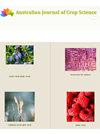超早熟普通豆品种BRS FC104对共接种的农艺性能响应
Q3 Agricultural and Biological Sciences
引用次数: 0
摘要
普通豆是巴西产量和消费量最大的品种之一,但这种作物的生产率仍然很低。新技术的使用提高了生产系统的性能,并使生产系统的管理具有更大的灵活性。利用超早品种与细菌共接种已成为一种很有前途的生产系统。因此,本研究旨在评价超早熟普通豆品种BRS FC104在共接种热带根瘤菌和巴西固氮螺旋菌后的农艺性能。在Santo Antônio de Goiás(2018/19水和2019年冬季)和Abadia de Goiás(2019年冬季)进行了三次田间试验。所有试验均采用2 × 3因子随机区组设计,采用2个普通豆类品种(BRS Notável和BRS FC104品种)和3个氮源(共接种热带扁豆+巴西扁豆;氮肥和未经处理的对照)。同时接种热带根瘤菌和巴西固氮螺旋菌,籽粒产量与施氮处理相当。超早品种BRS FC104的产量与正常周期品种BRS Notável相当。考虑到氮肥对环境的威胁和加强可持续生产的迫切需要,建议采用共接种方式培育超早熟品种BRS FC104,实现普通豆的可持续生产。本文章由计算机程序翻译,如有差异,请以英文原文为准。
Agronomic performance of the super-early common bean cultivar BRS FC104 in response to co-inoculation
The common bean is one of the most produced and consumed species in Brazil, but the productivity of the crop is still low. The use of new technologies has increased the performance of the production system and allowed greater flexibility in the management of the production system. The use of super-early cultivars combined with co-inoculation with bacteria has become a promising alternative for the production system. Thus, the objective of this work was to evaluate the agronomic performance of the super-early common bean cultivar BRS FC104 in response to co-inoculation of Rhizobium tropici and Azospirillum brasiliense. Three field experiments were conducted in Santo Antônio de Goiás (water 2018/19 and winter 2019) and in Abadia de Goiás (winter 2019). A randomized block design was used in a 2 x 3 factorial scheme for all experiments, being two common bean cultivars (BRS Notável and BRS FC104 cultivars) and three nitrogen sources (co-inoculation with R. tropici + A. brasilense; nitrogen fertilization and untreated control). The co-inoculation with Rhizobium tropici and Azospirillum brasilense resulted in grain yield equal to that of the nitrogen treatment. The super-early cultivar BRS FC104 showed equivalent productivity as the normal cycle cultivar BRS Notável. Considering that N-fertilizers are a threat to the environment and intensification of sustainable production is a pressing need, the cultivation of the super-early cultivar BRS FC104 under co-inoculation is a recommendation for the sustainable production of the common bean.
求助全文
通过发布文献求助,成功后即可免费获取论文全文。
去求助
来源期刊

Australian Journal of Crop Science
农林科学-农艺学
CiteScore
1.20
自引率
0.00%
发文量
75
审稿时长
3.5 months
期刊介绍:
Information not localized
 求助内容:
求助内容: 应助结果提醒方式:
应助结果提醒方式:


